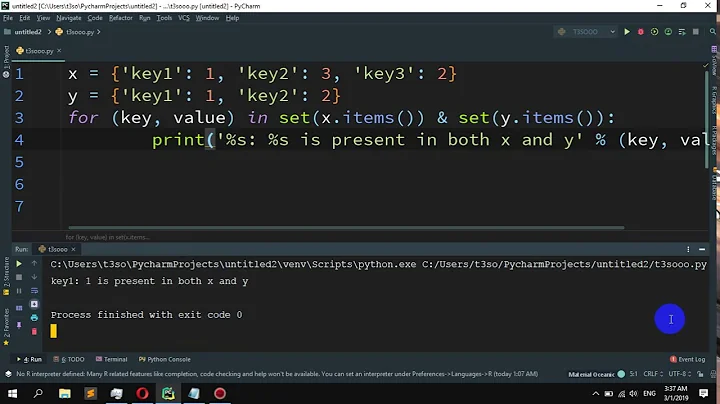Comparing two dictionaries and checking how many (key, value) pairs are equal
Solution 1
If you want to know how many values match in both the dictionaries, you should have said that :)
Maybe something like this:
shared_items = {k: x[k] for k in x if k in y and x[k] == y[k]}
print(len(shared_items))
Solution 2
What you want to do is simply x==y
What you do is not a good idea, because the items in a dictionary are not supposed to have any order. You might be comparing [('a',1),('b',1)] with [('b',1), ('a',1)] (same dictionaries, different order).
For example, see this:
>>> x = dict(a=2, b=2,c=3, d=4)
>>> x
{'a': 2, 'c': 3, 'b': 2, 'd': 4}
>>> y = dict(b=2,c=3, d=4)
>>> y
{'c': 3, 'b': 2, 'd': 4}
>>> zip(x.iteritems(), y.iteritems())
[(('a', 2), ('c', 3)), (('c', 3), ('b', 2)), (('b', 2), ('d', 4))]
The difference is only one item, but your algorithm will see that all items are different
Solution 3
def dict_compare(d1, d2):
d1_keys = set(d1.keys())
d2_keys = set(d2.keys())
shared_keys = d1_keys.intersection(d2_keys)
added = d1_keys - d2_keys
removed = d2_keys - d1_keys
modified = {o : (d1[o], d2[o]) for o in shared_keys if d1[o] != d2[o]}
same = set(o for o in shared_keys if d1[o] == d2[o])
return added, removed, modified, same
x = dict(a=1, b=2)
y = dict(a=2, b=2)
added, removed, modified, same = dict_compare(x, y)
Solution 4
dic1 == dic2
From python docs:
The following examples all return a dictionary equal to
{"one": 1, "two": 2, "three": 3}:>>> a = dict(one=1, two=2, three=3) >>> b = {'one': 1, 'two': 2, 'three': 3} >>> c = dict(zip(['one', 'two', 'three'], [1, 2, 3])) >>> d = dict([('two', 2), ('one', 1), ('three', 3)]) >>> e = dict({'three': 3, 'one': 1, 'two': 2}) >>> a == b == c == d == e True
Providing keyword arguments as in the first example only works for keys that are valid Python identifiers. Otherwise, any valid keys can be used.
Comparison is valid for both python2 and python3.
Solution 5
Since it seems nobody mentioned deepdiff, I will add it here for completeness. I find it very convenient for getting diff of (nested) objects in general:
Installation
pip install deepdiff
Sample code
import deepdiff
import json
dict_1 = {
"a": 1,
"nested": {
"b": 1,
}
}
dict_2 = {
"a": 2,
"nested": {
"b": 2,
}
}
diff = deepdiff.DeepDiff(dict_1, dict_2)
print(json.dumps(diff, indent=4))
Output
{
"values_changed": {
"root['a']": {
"new_value": 2,
"old_value": 1
},
"root['nested']['b']": {
"new_value": 2,
"old_value": 1
}
}
}
Note about pretty-printing the result for inspection: The above code works if both dicts have the same attribute keys (with possibly different attribute values as in the example). However, if an "extra" attribute is present is one of the dicts, json.dumps() fails with
TypeError: Object of type PrettyOrderedSet is not JSON serializable
Solution: use diff.to_json() and json.loads() / json.dumps() to pretty-print:
import deepdiff
import json
dict_1 = {
"a": 1,
"nested": {
"b": 1,
},
"extra": 3
}
dict_2 = {
"a": 2,
"nested": {
"b": 2,
}
}
diff = deepdiff.DeepDiff(dict_1, dict_2)
print(json.dumps(json.loads(diff.to_json()), indent=4))
Output:
{
"dictionary_item_removed": [
"root['extra']"
],
"values_changed": {
"root['a']": {
"new_value": 2,
"old_value": 1
},
"root['nested']['b']": {
"new_value": 2,
"old_value": 1
}
}
}
Alternative: use pprint, results in a different formatting:
import pprint
# same code as above
pprint.pprint(diff, indent=4)
Output:
{ 'dictionary_item_removed': [root['extra']],
'values_changed': { "root['a']": { 'new_value': 2,
'old_value': 1},
"root['nested']['b']": { 'new_value': 2,
'old_value': 1}}}
Related videos on Youtube
user225312
Updated on March 27, 2022Comments
-
user225312 about 2 years
I have two dictionaries, but for simplification, I will take these two:
>>> x = dict(a=1, b=2) >>> y = dict(a=2, b=2)Now, I want to compare whether each
key, valuepair inxhas the same corresponding value iny. So I wrote this:>>> for x_values, y_values in zip(x.iteritems(), y.iteritems()): if x_values == y_values: print 'Ok', x_values, y_values else: print 'Not', x_values, y_valuesAnd it works since a
tupleis returned and then compared for equality.My questions:
Is this correct? Is there a better way to do this? Better not in speed, I am talking about code elegance.
UPDATE: I forgot to mention that I have to check how many
key, valuepairs are equal.-
Natim about 8 years
x == yshould be true according to stackoverflow.com/a/5635309/186202 -
 Vikrant about 5 yearsx == y should be true. One can quickly check in REPL. Please Refer: docs.python.org/2/library/stdtypes.html#mapping-types-dict
Vikrant about 5 yearsx == y should be true. One can quickly check in REPL. Please Refer: docs.python.org/2/library/stdtypes.html#mapping-types-dict -
MestreLion over 2 years
x == yshould be true according to the official documentation: "Dictionaries compare equal if and only if they have the same (key, value) pairs (regardless of ordering). Order comparisons (‘<’, ‘<=’, ‘>=’, ‘>’) raise TypeError."
-
-
user225312 over 13 years@THC4k, sorry for not mentioning. But I have to check how many values match in both the dictionaries.
-
user225312 over 13 yearsOk, so based on my update, is my way of doing still incorrect?
-
Jochen Ritzel over 13 years@A A: I added why your's doesn't work when you want to count.
-
user225312 over 13 yearsI see, but in my case both the dictionaries are of same length. And they will always be, because that is how the program works.
-
Tim Tisdall almost 9 yearsUnfortunately this doesn't work if the values in the dict are mutable (ie not hashable). (Ex
{'a':{'b':1}}givesTypeError: unhashable type: 'dict') -
Tim Tisdall almost 9 yearsThis one actually handles mutable values in the dict!
-
Diego Tercero over 8 yearsIt seems that the task is not only to check if the contents of both are the same but also to give a report of the differences
-
 Bruno over 8 yearsThat's completly wrong, just parsing the data into json is really slow. Then hashing that huge sring you just created is even worse. You should never do that
Bruno over 8 yearsThat's completly wrong, just parsing the data into json is really slow. Then hashing that huge sring you just created is even worse. You should never do that -
WoJ over 8 years@Bruno: quoting the OP: "Better not in speed, I am talking about code elegance"
-
 Bruno over 8 yearsIt's not elegant at all, it feels unsafe and it's overly complicated for a really simple problem
Bruno over 8 yearsIt's not elegant at all, it feels unsafe and it's overly complicated for a really simple problem -
WoJ over 8 years@Bruno: elegance is subjective. I can understand that you do not like it (and probably downvoted). This is not the same as "wrong".
-
Mutant over 8 yearsSame error if there is list element for the dict key. I think cmp is better way to do it unless I am missing anything.
-
Trey Hunner over 8 yearsI believe this is identical to
dict1 == dict2 -
nerdwaller over 8 yearsFor anyone using Python3.5, the
cmpbuilt in has been removed (and should be treated as removed before. An alternative they propose:(a > b) - (a < b) == cmp(a, b)for a functional equivalent (or better__eq__and__hash__) -
AnnanFay over 8 years@Mutant that is a different issue. You cannot create a dictionary with a
listkey in the first place.x = {[1,2]: 2}will fail. The question already has validdicts. -
msc87 about 8 yearscan we use cmp(dict1,dict2) for comparing dictionaries with values as unordered list like: dict1={'a':[0,1]} and dict2={'b':[1,0]}?
-
Natim about 8 yearsThis is a great answer.
json.dumps(d, sort_keys=True)will give you canonical JSON so that you can be certain that both dict are equivalent. Also it depends what you are trying to achive. As soon as the value are not JSON serizalizable it will fail. For thus who say it is inefficient, have a look at the ujson project. -
ribamar over 7 years@annan: wrong, the question is generic. the example in the question description has already "valid dicts". If I post a new question, with same title, but with a different "invalid" dict, somebody will mark it as duplicate. Downvoting.
-
AnnanFay over 7 years@ribamar the question is "Comparing two dictionaries [...]". The 'invalid dict' above with
listkeys is not valid python code - dict keys must be immutable. Therefore you are not comparing dictionaries. If you try and use a list as a dictionary key your code will not run. You have no objects for which to compare. This is like typingx = dict(23\;dfg&^*$^%$^$%^)then complaining how the comparison does not work with the dictionary. Of course it will not work. Tim's comment on the other hand is about mutablevalues, hence why I said that these are different issues. -
ribamar over 7 years@annan: Ok, your comment about Mutant's question is correct (I misunderstood your concept of 'valid dict': there's nothing invalid doing
l = [] ; d = {1 : l}.dis valid dictionary and does not work as the same with the proposed solution. But now I see you're not denying that) -
NuclearPeon over 7 yearsDoes not work for
python3. Do this as the last line instead:list(zip(x.items(), y.items())) -
Xanthir over 7 yearsOnce you dump the string to JSON, you can just compare it directly. Hashing the two strings is just meaningless extra complexity. (Also, this only works if the dict is JSON-able, which lots aren't.)
-
Stefano over 7 years@nerdwaller - dicts are not orderable types, so dict_a > dict_b would raise a
TypeError:unorderable types: dict() < dict() -
nerdwaller over 7 years@Stefano: Good call, my comment was more for general comparison in python (I wasn't paying attention to the actual answer, my mistake) .
-
erik258 over 7 yearsThis may not do what was exactly requested, and pulls in the json std lib, but it does work ( as
json.dumpsis deterministic with the default settings ). -
 MikeyE about 7 years@TimTisdall You can get around the TypeError if you test both keys and items like this:
MikeyE about 7 years@TimTisdall You can get around the TypeError if you test both keys and items like this:set(x.keys())andset(x.values()). But, that only works if the dictionary has only one level of keys and values. If you have a nested{}or[]you'd need to perform the same operation recursively. -
Tim Tisdall about 7 years@MikeyE -
setrequires values to be hashable anddictrequires keys to be hashable.set(x.keys())will always work because keys are required to be hashable, butset(x.values())will fail on values that aren't hashable. -
Afflatus about 7 yearsWhen I run this, I still get an error seeing dealing with the mutable values: ValueError: The truth value of a DataFrame is ambiguous. Use a.empty, a.bool(), a.item(), a.any() or a.all().
-
Afflatus about 7 years@TimTisdall For comparing dictionaries with unhashable items, see: stackoverflow.com/questions/43504568/…
-
 Daniel Myers almost 7 years@Afflatus -
Daniel Myers almost 7 years@Afflatus -DataFrames by design don't allow truthy comparisons (unless it has a length of 1) as they inherit fromnumpy.ndarray. -credit to stackoverflow.com/a/33307396/994076 -
Qi Luo almost 7 yearsI don't agree with @ErkinAlpGüney. Could you provide a proof?
-
Matthew Nakayama over 6 yearsI disagree with @ErkinAlpGüney. The official documentation shows that == does indeed compare dictionaries by value, not by address. docs.python.org/2/library/stdtypes.html#mapping-types-dict
-
Jesuisme over 6 yearsWorks for Python 2.7.13
-
ankostis about 6 yearsDoes not work with
OrderedDict:odict=OrderedDict; assert odict([(1, 1), (2, 2)]) == odict([(2, 2), (1, 1)])fails! -
 Pedro Lobito about 6 years@ankostis:
Pedro Lobito about 6 years@ankostis:OrderedDict != dict -
 EL_DON about 6 yearsIf you use
EL_DON about 6 yearsIf you usenot isinstance(dict1, dict)instead oftype(dict1) is not dict, this will work on other classes based ondict. Also, instead of(dict1[key] == dict2[key]), you can doall(atleast_1d(dict1[key] == dict2[key]))` to handle arrays at least. -
styrofoam fly almost 6 years@PedroLobito passing tests is not a proof for the code to be correct.
-
 Pedro Lobito almost 6 years@styrofoamfly I'm not following your line of thought, care to clarify?
Pedro Lobito almost 6 years@styrofoamfly I'm not following your line of thought, care to clarify? -
styrofoam fly almost 6 years@PedroLobito you cannot prove that "for each input the algorithm produces the expected output" (the definition of correctness). The tests prove only that "for some inputs the algorithm produces the expected output".
-
Phil almost 6 yearsAs of Python 3.6, dict is orderd out-of-the-box.
-
nkadwa over 5 yearsLet's improve it so it works both ways. Line 2: "for x1 in set(dict1.keys()).union(dict2.keys()):"
-
 Pedro Lobito over 5 yearsCan you please provide an input where this isn't true?
Pedro Lobito over 5 yearsCan you please provide an input where this isn't true? -
James Hirschorn over 5 years@PedroLobito make a
dictwith keys mapping to array if you want to seedict1 == dict2fail with an error message. -
 Filnor over 5 yearsWelcome to Stack Overflow! While this code snippet may solve the question, including an explanation really helps to improve the quality of your post. Remember that you are answering the question for readers in the future, and those people might not know the reasons for your code suggestion. Please also try not to crowd your code with explanatory comments, this reduces the readability of both the code and the explanations!
Filnor over 5 yearsWelcome to Stack Overflow! While this code snippet may solve the question, including an explanation really helps to improve the quality of your post. Remember that you are answering the question for readers in the future, and those people might not know the reasons for your code suggestion. Please also try not to crowd your code with explanatory comments, this reduces the readability of both the code and the explanations! -
zwep over 4 yearsThanks @nkadwa, it does now
-
 Pedro Lobito over 4 years@JamesHirschorn The answer is only valid for the examples it shows.
Pedro Lobito over 4 years@JamesHirschorn The answer is only valid for the examples it shows. -
James Hirschorn over 4 years@PedroLobito That is irrelevant. You had asked "Can you please provide an input where this isn't true?", and this is what I was commenting on.
-
 pfabri almost 4 years+1, but you could break out of your
pfabri almost 4 years+1, but you could break out of yourfor loopas soon as yourdicts_are_equalbecomes false. There's no need to continue any further. -
JavaSa over 3 years@JochenRitzel: How this works for deep nested dictionaries inside dicts? I tried this on deep nested dicts, with exactly the same value but order was different, and comparison failed
-
 thiezn over 3 yearsI was suprised myself but it seems I can just compare nested dicts out of the box with == (using python3.8).
thiezn over 3 yearsI was suprised myself but it seems I can just compare nested dicts out of the box with == (using python3.8).>>> dict2 = {"a": {"a": {"a": "b"}}} >>> dict1 = {"a": {"a": {"a": "b"}}} >>> dict1 == dict2 True >>> dict1 = {"a": {"a": {"a": "a"}}} >>> dict1 == dict2 False -
Stevko almost 3 yearsthis one is especially useful for unit testing: self.assertDictEqual(result, expected_result)
-
luca.giovagnoli over 2 yearsWhat about
In [6]: x = {"key": True} In [7]: y = {"key": 1} In [8]: x == y Out[8]: True? -
 Admin over 2 yearsYour answer could be improved with additional supporting information. Please edit to add further details, such as citations or documentation, so that others can confirm that your answer is correct. You can find more information on how to write good answers in the help center.
Admin over 2 yearsYour answer could be improved with additional supporting information. Please edit to add further details, such as citations or documentation, so that others can confirm that your answer is correct. You can find more information on how to write good answers in the help center.





